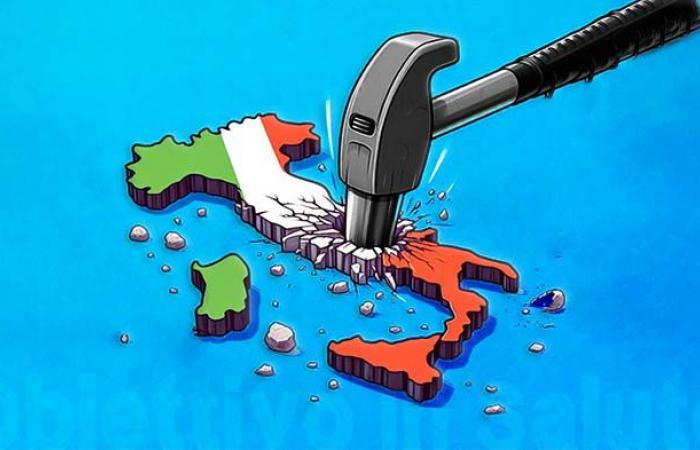Yesterday Zaia declared that the Veneto region has moved to request the resumption of negotiations with the government on 9 of the 23 matters affected by differentiated autonomy. To fully understand the meaning of this request, and not reduce it simply to Veneto particularism, we need to take a longer tour.
In an article published on June 29 on Contropiano, it was reported that, according to data from the Gimbe Foundation, health migration, or moving to access care, presents a positive balance of 4.25 billion euros for the North. Almost all of this sum ends up in Emilia-Romagna, Veneto and Lombardy.
Anyone who follows the economic events of our country a little is immediately drawn to the fact that the three regions mentioned are also those that have integrated most closely into the continental supply chains, albeit in a subordinate position.
It is therefore natural to ask what prospects the recently approved reform opens up for the advancement of the European imperialist construction. And since one of its almost constitutive elements has been the model export oriented German, now bankrupt but kept alive by force, it may be useful to start from a fact that Renato Brunetta also recently dwelt on.
In an article published on June 22nd in Il Riformista, the president of CNEL recalls that 70% of Italian exports are produced in the North (ISTAT data 2022 and 2023). In his opinion, the South consumes the resources accumulated by international tradewhich reach them through internal transfers.
A scheme that comes directly from the economic miracle, and forgets all the complexities that have simply accumulated in 60 years of history. As if Italy were the same as when we had the IRI and the Cassa per il Mezzogiorno.
A scheme I would say from seventeenth-century mercantilism, in which wealth is written in the current accounts of the state and ignores the benefits of a fair redistribution of income. And it also ignores those 4.25 billion in health care benefits.
Brunetta’s words cannot but provoke anger, as he states that “In general, the most productive areas of the country have contributed to financing the most disadvantaged territories, but the gap has certainly not diminished“Again, Brunetta forgets that the gap had been partially filled, as long as there was some public industrial planning.
There is therefore not a word of criticism towards the evident failure of the ruling class of the last thirty years, which should logically follow his words.
A ruling class of which he was a part, first as a member of the European Parliament from 1999 to 2008, and then as a member of the Republic from 2008 to 2022, also holding the position of minister for three years.
According to Brunetta, “faced with a country split like an apple, it makes no sense to diagnose uniform recipes across the entire national territory“.
It is a pity that differentiated autonomy is not a development direction considered on the basis of local specificities, but is precisely the gives up on implementing a national program for development and the reduction of inequalities.
Asymmetries and distances that will instead be widened by differentiated autonomy, despite the much discussed Essential Levels of Performance. Even more so if the criterion of “historical expenditure“, which crystallizes current distortions.
According to some opposition parliamentarians, in order to be concretely determined and guaranteed throughout the national territory, the LEP would require between 50 and 100 billion in additional expenditure, almost twenty according to the most cautious estimates.
Here then another question arises. Differentiated autonomy is almost a point of arrival of a path that has already largely devastated the structures of the state to favor the penetration of the public in all its services.
So what is the point of this reform for this pro-European ruling class? And is it really feasible, given the costs, unless they want to create LEPs that are only for show – which is certainly not excluded –?
Luca Bianco asks this clearly in an article on Huffington Post: “How can we finance them now that Italy must comply with the new Stability Pact?” Budgetary constraints have caused the dismantling of the public sector, and now they also prevent differentiated autonomy?
Obviously not, as it is a reform completely inserted in the logic of Brussels. In fact, the subjects of “competing legislation” on which the regions will be able to request autonomy are 23, but the Technical Committee for the identification of the LEP has made a distinction between these.
14 have direct implications with the LEP (including health protection), 9 do not. The latter are: international relations; foreign trade; professions; civil protection; supplementary pensions; coordination of public finances; regional savings banks; regional credit institutions; administration of the justice of the peace.
The first two will allow ad hoc agreements between the regions and Brussels. Supplementary pensions, coordination of public finances, regional savings banks and credit institutions play an important role in determining the framework in which entrepreneurial activity takes place.
Whether this possibility, to split the 23 subjects, is legally admissible is still a matter of debate. Even within the majority, opinions are not homogeneous, but Zaia has decided to force the hand, partly to respond to his own electorate, partly because it was the underlying meaning of this project from the beginning.
The point is that, at most, differentiated autonomy completes a process of dismantling the role of the state and essential services that began with Maastricht and was then accelerated by the reform of Title V of the Constitution, carried out by the centre-left.
What really matters is accelerate the construction of EU supply chains capable of competing with other major global players. How the mediation with the government will go, given the internal competition between the various formations, we cannot yet know, but the path is that and, as has always been the case in the EU, it is constrained.
July 2, 2024 – © Reproduction possible WITH THE EXPLICIT CONSENT of the EDITORIAL BOARD of CONTROPIANO
Last edit: July 2, 2024, 7:32 am
press






